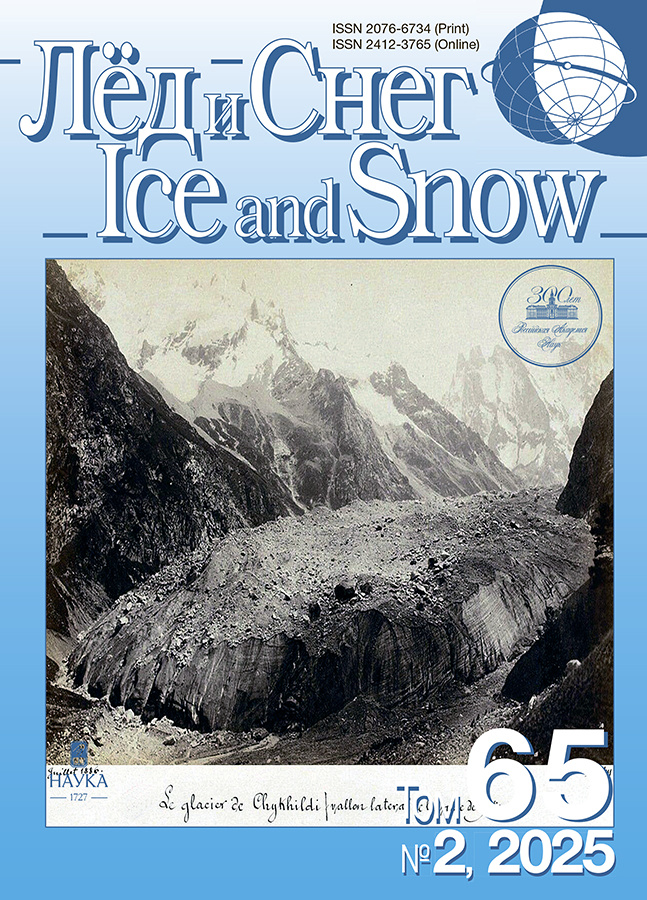On the possible influence of the Kolka Glacier bed on its dynamic instability
- Авторлар: Chernov R.A.1, Muraviev A.Y.1
-
Мекемелер:
- Institute of Geography, Russian Academy of Sciences
- Шығарылым: Том 65, № 2 (2025)
- Беттер: 210-217
- Бөлім: Glaciers and ice sheets
- URL: https://journals.eco-vector.com/2076-6734/article/view/688394
- DOI: https://doi.org/10.31857/S2076673425020029
- EDN: https://elibrary.ru/FPVKCY
- ID: 688394
Дәйексөз келтіру
Аннотация
After the Karmadon catastrophe of 2002, the viewpoint was discussed that the important factors triggered the Kolka Glacier collapse were post-volcanic processes beneath the glacier and the accumulation of significant volumes of water in the glacier body. Both factors are directly related to the conditions on the glacier bed. The hypothesis of a possible change in the conditions of the Kolka Glacier sliding along the bed, leading to dynamic instability, was proposed earlier in the results of studies of its movement in 1969–1972. Field studies in the Kolka Glacier cirque in September 2024 revealed several thermokarst funnels in which ice is exposed. In the thermokarst funnel located near the glacier front, the visible ice thickness exceeds 20 m. The location of the thermokarst funnels and the surface character in the glacier foreland indicate the presence of an extensive layer of dead ice appears to extend just in front of the glacier and served as the sliding plane along which the glacier left the bed in 2002 In the last 6 years, a significant advance of glacier terminus (up to 70 m per year) has been noted, the revived glacier moves over a layer of dead ice and its speeds are close to the critical values on the eve of the 1969 movement. It is possible that the water in the glacier body will influence its dynamic instability in the future, since the meltwater runoff from the cirque is of a subglacial nature. The accumulation of water in the glacier body can be facilitated by deformation of the ice mass at the bed and obstruction of drainage.
Негізгі сөздер
Толық мәтін
Авторлар туралы
R. Chernov
Institute of Geography, Russian Academy of Sciences
Хат алмасуға жауапты Автор.
Email: chernov@igras.ru
Ресей, Moscow
A. Muraviev
Institute of Geography, Russian Academy of Sciences
Email: chernov@igras.ru
Ресей, Moscow
Әдебиет тізімі
- Aristov K.A., Petrakov D.A., Kovalenko N.V., Timonin S.A., Kolchin A.A., Drobyshev V.N. Monitoring of Kolka Glacier in 2014–2017 by terrestrial stereophotogrammetry. Led i Sneg. Ice and Snow. 2019, 59 (1): 49–58. https://doi.org/10.15356/2076-6734-2019-1-49-58 [In Russian].
- Berger M.G. Lednik Kolka. Katastrofa 20 sentyabrya 2002 goda – vnezapnyy gazodinamicheskiy vybros lednika. Kolka Glacier. The Catastrophe of September 20, 2002 – sudden gas-dynamic ejection of the glacier. Moscow: LKI Publishing House, 2007: 246 p. [In Russian].
- Vaskov I.M. Possible mechanism of collapse and dynamics of icerock masses in the upper reaches of the Genaldon river. Vestnik Vladikavkaz Scientific Center. Bulletin of the Vladikavkaz Scientific Center. 2004, 2: 34–45 [In Russian].
- Gurbanov A.G., Gazeev V.M., Leksin A.B., Dokuchaev A. Ya., Tsukanova L.E. Izuchenie dinamiki teplovogo polya v konturah vyyavlennoj distancionnymi metodami teplovoj anomalii (po dannym nazemnyh termodatchikov). Lednik Kolka: vchera, segodnya, zavtra. Study of thermal field dynamics in contours of thermal anomaly detected by remote methods (according to data from ground-based temperature sensors). Kolka Glacier: yesterday, today, tomorrow. Vladikavkaz: Scientific Center of the Russian Academy of Sciences and the Russian North Ossetian, 2014: 74–87 [In Russian].
- Desinov L.V. Pulsation of the Kolka Glacier in 2002. Vestnik Vladikavkaz Scientific Center. Bulletin of the Vladikavkaz Scientific Center. 2004, 4 (3): 72–87 [In Russian].
- Katalog Lednikov Rossii. Glaciers of Russia. Retrieved from: URL: https://www.glacru.ru/ледниковые-районы/кавказ/ (Last access: April 1, 2020) [In Russian].
- Kotlyakov V.M., Rototaeva O.V., Nosenko G.A., Desinov L.V., Osokin N.I., Chernov R.A. Karmadonskaya katastrofa – chto sluchilos i chego zhdat dalshe. Karmadon disaster: what happened and what to expect further. Moscow: “Kodeks” Publishing House, 2014: 184 p. [In Russian].
- Muraviev Ya.D. Gas eruption in the circus is a possible cause of development of the Kolka glacier movements by the catastrophic scenario. Materialy Glyatsiologicheskikh Issledovaniy. Data of Glaciological Studies. 2005, 98: 44–55 [In Russian].
- Nosenko G.A., Rototaeva O.V., Nikitin N.A. Features of changes in the Kolka glacier from 2002 to 2016. Led i Sneg. Ice and Snow. 2017, 57 (4): 468–482 [In Russian].
- Poznanin V.L. Mekhanizmy selevykh lednikovykh katastrof. Mechanisms of mudflow glacial disasters. Moscow: Institute of Mineralogy, Geochemistry and Crystal Chemistry of Rare Elements, 2009: 182 p. [In Russian].
- Rototaev K.P. Khodakov VG, Krenke A.N. Issledovanie pulsiruyuschego lednika Kolka. Study of the pulsating Kolka Glacier. Moscow: Science, 1983: 169 p. [In Russian].
- Chernov R.A., Rototaeva O.V. On the development of postcatastrophic processes in the cirque of the Kolka glacier and the valley of the river Genaldon (the northern slope of the Kazbek massif). Led i Sneg. Ice and Snow. 2010, 4: 25–29 [In Russian].
- glacru.ru: official site. Retrieved from: URL: https://www.glacru.ru (Last access: February 23, 2025).
Қосымша файлдар











